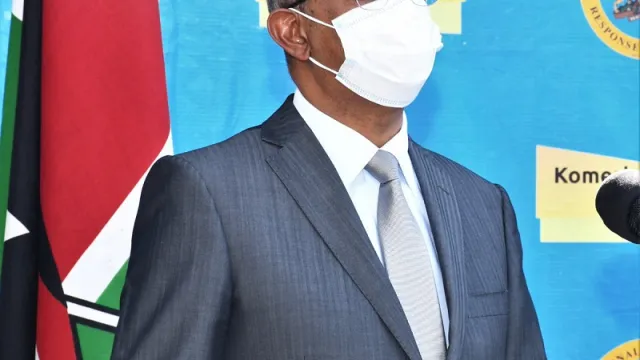Prioritise TB vaccine research to fight the disease, health experts advise

Prioritise TB vaccine research to fight the disease, health experts advise
Health experts have called for greater investment into research and development for new tuberculosis (TB) vaccines to end the deadly infectious disease that still kills over 4000 people per day, including 700 children.
The experts told world leaders to ramp up support for new vaccine research to deliver new, effective, safe, equitable and affordable TB jab by 2025.
Shortfall in funding, they added, were the shortcomings derailing the 2025 deadline. For example, in 2019, TB vaccine research investment only took US$117 million, against a target of at least US$550 million per year over a period of four years to achieve the deadline.
However, by comparison, Covid-19 pandemic vaccine research received over US$100 billion in funding over the past year.
“What the world has achieved in the past year with regards to the development of safe and effective COVID-19 vaccines is astonishing and worth celebrating,” said Dr Lucica Ditiu, Executive Director of the Stop TB Partnership during a virtual media briefing.
“Today, we call on the world to provide sufficient financial resources and political will by 2023 to allow for the rollout of an effective TB vaccine by 2025. Lessons learned from recent pandemics clearly show that it is possible,” added Dr Ditiu.
Kenya is among countries with the highest TB prevalence in the world with a rate of 291 cases per 100,000 people. The disease claims about 29,000 lives in the country every year.
The prevalence of the disease has been attributed to the high poverty levels in the country through poor nutrition, overcrowding, alcohol and substance abuse and poor access to health care services.
Read also: Kakuzi’s grit shows agriculture stocks could change NSE outlook
Currently, there is only one vaccine in existence against TB—the BCG vaccine—which was first administered on July 18, 1921. The vaccine has proven effective against TB meningitis and in protecting against severe TB in infants and young children.
However, it offers variable and mostly poor protection against lung disease in adolescents and adults, the populations that are more likely to spread TB in the community.
In 2018, at the United Nations High-Level Meeting on Tuberculosis, world leaders committed to developing new, effective, safe, equitable and affordable TB vaccines as soon as possible but failed to deliver the necessary investments for doing so.
In 2019, an estimated 10 million people fell ill from TB, and the World Health Organization estimates that in 2020, nearly two million people died from the disease. The worst impacts are felt in some of the poorest parts of the world and among vulnerable groups.
“Despite our best efforts, we are still falling short of targets set at the 2018 United Nations High-Level Meeting on Tuberculosis, and at this rate, we will not meet the Sustainable Development Goals target of ending TB by 2030,” said professor David Lewinsohn, chair of Stop TB Partnership’s the Working Group on New TB Vaccines. “To interrupt ongoing transmission, we need new and more effective vaccines that can prevent TB in adolescents and adults.”
“Effective vaccines are critical to ending the TB epidemic,” said Caroll Nawina, a TB survivor and advocate for policy change at national, regional and international levels.
“But having a vaccine is not enough if it is not affordable and accessible to all. The distribution of COVID-19 vaccines has clearly shown the inequalities and inequities of a system that favors the rich. We will not accept such a situation in TB, and we must ensure future TB vaccines reach those most in need.”
More than 15 TB vaccines have been in development for over 15 years, but none of them have been approved for use.
However, recent, significant trial results suggest new and effective TB vaccines can be developed in the coming years if appropriate investments are made, with experts today calling for at least US$550 million in funding per year.
“With multiple vaccine candidates preparing for late-stage efficacy trials and next-generation vaccines based on mRNA and other novel platforms on the way, there has never been a better time to invest in TB vaccine research and development,” said Lewinsohn.
Read also: Kenya diaspora inflows hit Kes 33.1 billion in June
Dr Lorraine Mugambi Nyaboga, chief of party TB Accelerated Response and Care II (TB ARC) project notes that just as Covid-19, TB is transmitted through droplets and presents in a similar manner.
“And so many patients, who presents might have TB symptoms such as cough, fever, weight loss will not present to the facility. We are now seeing a reduction of number of patients that are coming to our facilities,” explains Dr Mugambi.
World leaders of the G7 group of countries committed recently that they would develop safe and effective vaccines ready to be produced at scale and equitably deployed in under 100 days in the event of future pandemic threats. The ‘100 Days Mission to Respond to Future Pandemic Threats’ details how world leaders can rapidly respond to new disease outbreaks.
“As we welcome the G7’s 100 days commitment to tackle future pandemics, such commitments must be extended to existing pandemics, including tuberculosis, which still causes catastrophic social and economic devastation around the world every year, and particularly among already vulnerable populations,” said Ditiu.



